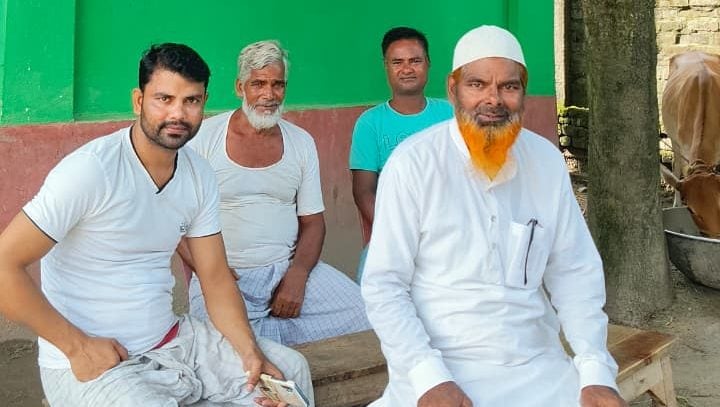Araria, Kishanganj (bihar)August 31, 2025 08:16 PM IST
First published on: Aug 31, 2025 at 08:15 PM IST
THESE DAYS, RJD’s Jokihat MLA Shahnawaz Alam has been spending most of his time at his ancestral village Sisauna in Bihar’s Araria district. With the Election Commission’s September 1 deadline for uploading of identity documents as part of the Special Intensive Revision (SIR) looming, Alam is worried that document submission in his constituency hasn’t crossed 85%.
Araria is part of Bihar’s Seemanchal region, whose four districts have a substantial Muslim population. While in Kishanganj, over 70 per cent of the population is from the minority community, Purnia, Araria and Katihar have 40-45 per cent Muslim population as opposed to the state’s 17 per cent.
During the ongoing SIR process, the four Seemanchal districts had recorded a rush of people applying for residential certificates – one of the 11 EC-mandated identity documents. According to government data, in the first two weeks of July, Purnia received 98,200 applications, Katihar 1.32 lakh, Kishanganj 3.23 lakh and Araria 53,556 applications.
Bihar Deputy CM Samrat Choudhary had told The Indian Express that the surge in residential applications in the region suggested “that many of the applicants are immigrants from other countries. We suspect a sizable percentage of the people in Kishanganj could be from Bangladesh, Nepal and Bhutan”.
Jokihat MLA Alam disagrees, saying the rush for domicile certificates is because people in the region, among the most backward in the state, have few documents other than Aadhaar and ration card – both of which are not among the EC’s list of 11 identity documents for the SIR process.
“This is not a developed region. The Jokihat Assembly seat would not have more than 10 per cent voters with Class 10 certificates. Which is why, residential certificates are the most sought after of the 11 documents mandated by the EC,” he says.
In Jokihat block alone, over 50,000 applications for residential certificates are pending with the Right to Public Service centre.
“Not more that 1,000 applications are issued per day. How will we ever meet the deadline? We have serious apprehensions that a lot of people may end up getting dropped from the final electoral roll,” says Alam, son of former Union minister, the late Mohammed Taslimuddin, a towering personality in Seemanchal politics.
Asked about the high pendency of residential applications in Seemanchal and some other regions, an official of the Bihar Administrative Reforms Mission, the nodal agency for service delivery in the state, said, “We have to stop our services intermittently because there are too many applications for domicile certificates. Since the SIR began, we have received over 80 lakh domicile applications from across the state. Since we have a big number of applications from Seemanchal districts, the process is taking time.”
At Sisauna village of Araria, Abdul Mannan, a former mukhiya, says that until Aadhaar and ration cards are allowed to be submitted, several electors in his village, most of them women and daily wagers, might end up outside the voter list. “Despite our best efforts, we have not been able to get BLOs to people’s doorsteps to collect their documents or guide them,” says Mannan.
One of the three BLOs of Sisauna village, who spoke on condition of anonymity, says about 10-12 per cent of the 1,800 electors only have Aadhaar or ration cards as identity proof.
At Thakurganj in Kishanganj district, a Booth Level Officer – the EC-appointed official tasked with getting the forms filled and documents uploaded ahead of the deadline – says, “Most people have submitted domicile certificates. Those who were not able to submit one of the 11 documents have applied for these certificates. But that’s taking time since authorities have to verify their identity.”
Voter list deletions
About 100 people, either marked as ‘dead’ or ‘permanently shifted’, have been deleted from the draft rolls. Asked if there could be more deletions, the BLO says, “It is up to my supervisors. Who knows, there could be some deletion – at least five to seven per cent people are in the danger zone”.
At the Bahadurganj Block Office in Kishanganj district, where BLOs are busy sorting documents of electors, an official says 87 per cent forms in the block have been uploaded with one of the 11 documents.
One of the BLOs says they have been facing problems over voters using aliases. “In some cases, the names of voters do not match their other documents as they would have used aliases in the Voter I card,” he says.
At Guna Chaurasi village in Bahadurganj, Khurshid Alam (56), a small businessman, who is on 2003 list, says, “My first name is Khurshid, but it’s spelt as Khurashid in the draft roll. That’s causing me trouble. Also, my wife’s name is Mahenigar but her 2003 list says Nigar Jehan. She has now been asked to produce her father’s identity papers along with an affidavit stating that she is Mahenigar, not Nigar Jehan. But we have no time left to carry out these corrections. I have consulted a lawyer to seek a remedy”.
Rukhsana Khatun, who has turned up at the Bahadurganj Block Office to submit his documents, says, “I have no clue how to get my parents’ identity documents. They were not voters in 2003. I have got my father’s Aadhaar card. If they consider it, I will stay on the voter list. If not, I’ll be out.”


